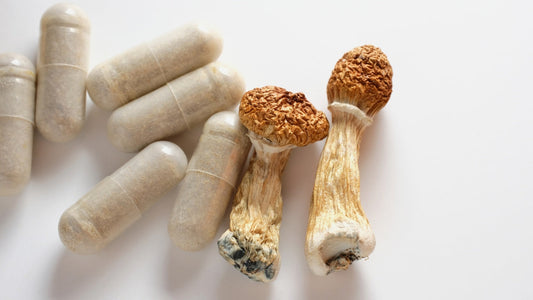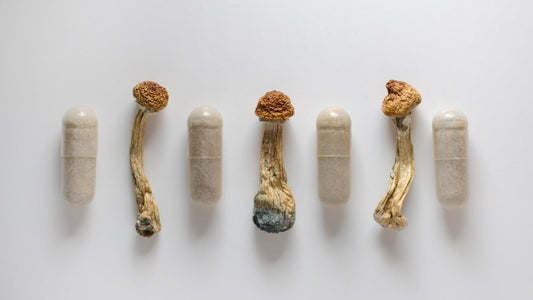Self-improvement...
It's a form of evolution, isn't it?
So why wouldn't we want to do it?
Our ancestors, they took care of their end of the deal. They got us this far. They handed us the baton and quite frankly, we have a lot to live up to.
Mastering fire - done.
Cultivating agriculture - done.
Evolving language - done.
There's a whiff of sibling rivalry going on here. They were annoyingly good at everything and it's making us look bad.
It's in our DNA to want to do better.
But if someone called you a perfectionist...is that an insult or a compliment?
Because on one hand, perfect is packaged as a good thing. Who wants to make mistakes? Getting the response, "That's perfect", has us smiling on the inside - right?
But on the other hand, perfection can mean we set ourselves impossibly high standards. Which can come with a whole host of negative side effects.
Is there good perfection and bad perfection?
The answer is, of course there is. But there's more to it than that...
According to a recent survey (1) 92% of respondents consider themselves perfectionists. 72% believe that leads to anxiety and depression. 86% believe their work is impacted by the perfectionist expectations of others.
One way or another, we're all affected by perfectionism. So learning how to deal with it, is key.
In this article we go over the basics, delve a little deeper into the theory, and identify how our go-to 'type' of perfection might be holding us, or others back.
Perfection 101: What is a Perfectionist?

Perfectionism is a personality trait defined by the setting of, and striving for, excessively high standards.
And it's not just a work thing.
It translates into all aspects of our lives. But it's mainly the narrative that accompanies our actions that can cause the problems. At top level, there are two types of perfectionism.
Healthy Perfectionism
Also known as adaptive perfectionism. This involves setting high standards and goals, whilst still maintaining a balanced mindset.
People with healthy perfectionism get a kick from their achievements but see their mistakes as opportunities for growth and learning. Adaptive perfectionists are comfortable with a little 'failure'. Because their narrative is: failure results in knowledge. And knowledge equals power.
Unhealthy Perfectionism
Sometimes called maladaptive perfectionism. This involves setting high, or unattainable standards, and valuing worth based on the ability to achieve those standards. It's often accompanied by a negative narrative: this isn't good enough, and so you're not good enough.
Some might say that maladaptive perfectionists aren't really looking for perfection at all - and instead are just avoiding 'not being good enough'. The mantra that gets repeated here is one of self-criticism.
We gaslight ourselves.

And it's usually never ending.
Because one of the traits of maladaptive perfectionists, is they struggle to get things finished on time. Mainly because it's never 'good enough'. And let's not forget, 'perfect' is subjective. So there's no clear definition of what's needed in the first place.
This form of perfectionism can lead to various negative outcomes, including conflict, anxiety, isolation, and burnout.
What's the Difference Between Perfectionists and High-Achievers?

Toxic perfectionists are maladaptive. High achievers are adaptive.
But what about this:
When re-releasing the film Titanic in 3D, James Cameron re-edited a scene because the stars were in the wrong positions. Despite the film grossing $1.3 billion and scooping 11 Oscars, a tip-off from an astrophysicist really niggled Cameron. He couldn't let it lie. So he changed it...15 years after the original release.
Perfectionist or High Achiever?
On one hand, this example reeks of maladaptive. Because even when perfectionists achieve success, they often don't feel satisfied, or they downplay their achievements because they focus on minor flaws or what could have been better.
But also, it could fit the high achiever - he saw his mistake, he learned from it, and when the opportunity arose, he amended it.
Another one for you:
Michelangelo, in his 70s, set about creating a marble Pietà sculpture intended for his own tomb. After enormous effort, and problems with impurities in the marble, he abandoned the work and took a sledgehammer to it.
Perfectionist or High Achiever?
Did Michelangelo's relentless pursuit of perfection and rigid standards mean he struggled to adapt when things didn't go to plan? Did this inflexibility hinder his performance, creativity, and lead him to ultimately throw his toys out of the pram?
Or did Michelangelo adjust his goals and methods? Did he stand back, assess the situation, see it was a sunk cost fallacy and cut his losses? Did he even destroy the Pietà? Or was he about to rework it?
In all of these cases there's a goody and a baddy. The goody is Adaptive Perfectionism. The baddy is Maladaptive Perfectionism.
But for most of us, we're somewhere in between.
Perfection is more nuanced than that. And knowing where we sit, can help us stay on the right side of our preferred perfectionism.
Perfectionism: A Deeper Dive

Psychologists Paul L. Hewitt and Gordon L. Flett suggest that perfectionism as a construct, is multi-dimensional. It goes beyond the simple 'healthy' and 'unhealthy'. They suggest there are three types of perfectionism. (2)
Each type can lead to different psychological outcomes and challenges. So understanding these distinctions can help us navigate how to get the best from them.
Self-Oriented Perfectionism:
This type of perfectionism is directed inward, toward ourselves.
At our best: Our internal drive to excel spurs us on to do a good job. We take pride in our work, have meticulous attention to detail and a strong work ethic. We get a genuine sense of accomplishment in personal achievements and are committed to continuous improvement.
At our worst: We are our harshest critics. The pressure to meet our own high standards can lead to significant personal stress and anxiety. We may also be prone to procrastination and putting things off. Rather than risk failure - it's best to not start them. We're likely to work longer hours and worry over smaller details - which makes us prone to burnout.
Other-Oriented Perfectionism:
This type of perfectionism is directed outwards. Towards family members, friends, or colleagues.
At our best: We're healthy leaders. We hold the vision of what can be achieved, and we inspire others to reach greater heights. We're motivators. By setting high standards, we encourage and coach others to deliver their very best. We foster growth. Our expectation of high-performance pushes others to develop new skills, to go the extra mile, and strive for personal and professional growth.
At our worst: We can be overly demanding and critical of others. This can result in an unhappy or stressful work environment and isn't great for relationship building. We also can't delegate. We struggle to relinquish responsibility, which can result in taking on extra stress. It can also limit others' opportunity for development. We're slightly intolerant of anyone we perceive to not be trying as hard or meeting our standards. We affect team dynamics and are sometimes seen as controlling.
Socially Prescribed Perfectionism:
This type of perfectionism means we think everyone else has extremely high expectations of us. And if we want to be liked and accepted, we need to meet those expectations.
At our best: We are self-deprecating, yet striving for success. We feel energized by those around us, and are happy to take on the challenge. We're modest and usually work well within a team. We're approachable and relatable. Because we feel the pressure from others, we're more likely to help anyone we see struggling. We are chameleon like. We adapt to any situation.
At our worst: We think everyone is judging us. We take even constructive criticism to heart, which can impact our confidence and self esteem. We often imagine that even if someone is happy with what we've achieved, they are secretly picking it apart. We are prone to working late and burnout.
Hewitt and Flett's model highlights the multidimensional nature of perfectionism. It gives us the hows and whys of our preferred version, and what each looks like when it's healthy, and unhealthy.
If we want to avoid stress, burnout, and self-doubt, we should aim to stay on the healthy side of our particular perfection. Changing some of our behaviors, and the way we talk to ourselves, can really help.
Tips for Staying on the Healthy Side of Perfectionism

- Embrace Constant Evolution: In a fast-paced world, the "ideal solution" can quickly become outdated. View success as a process of ongoing adaptation, rather than reaching the final goal.
- Define 'Good Enough' Outcomes: Ask yourself what a satisfactory result would look like for each task. Remember, not everything requires perfection.
- Challenge 'All or Nothing' Thinking: Avoid binary perspectives where something is either perfect or a failure. Use positive self-talk to acknowledge the quality of your work even if it's not flawless.
- Appreciate Good Work: Acknowledge and express gratitude for your team's achievements. Positive reinforcement can counterbalance any negative feelings and motivate further success.
- Never apply your version of perfectionism to others: Not everyone shares your drive. Imposing high standards on others can strain relationships and create a stressful work environment. Focus on collaboration and completion rather than perfection.



